- Home
- Kim Newman
The Man From the Diogenes Club Page 46
The Man From the Diogenes Club Read online
Page 46
‘Don’t even think about it, kiddo,’ said a voice close to his ear. ‘World’s safe till midnight, at least. After that, it gets blurry… but Madame Amboise sees all. Worry not your pretty little head.’
He recognised Annette from her perfume, Givenchy mingled with Gauloises, before he heard or saw her. She spun him round and kissed both his cheeks, not formally. Her wet little tongue dabbed the corners of his mouth.
For the trip, she had turned out in a black cocktail dress, elbow-length evening gloves, a shiny black hat with a folded-aside veil and a white fox-fur wrap with sewn-shut eyes. This evening, she wore lipstick – thin lines of severe scarlet. She posed like Audrey Hepburn, soliciting his approval, which was certainly forthcoming.
‘That’s the spirit,’ she said, patting his cheek.
He had a mental image of Annette in her underclothes – black, French and elaborate. It flustered him, and she giggled.
‘I’m doing that,’ she said. ‘It’s a trick.’
She slipped off her shoulder strap to show black lace.
‘And it’s accurate,’ she added. ‘Sorry, I mustn’t tease. You’re so easy to get a rise out of. I don’t get to play with anyone in the know very often.’
She tapped the side of her head and made spooky conjuring gestures.
Under her brittle flirtatiousness, she ran a few degrees high, trying to shake off a case of the scareds. That, in turn, worried him. Annette Amboise might come on like the Other Woman in a West End farce, but in the Diogenes Club’s trade – not to mention actual war – she was a battle-proved veteran. All he’d ever done was switch some wires. If she knew enough to be frightened, he ought to be terrified.
‘Aren’t the arches magnificent?’ she said. ‘They’ll be knocked down in a year or two. By idiots and philistines.’
‘You’re seeing the future?’
‘I’m reading the papers, darling. But I do see the future sometimes. The possible future.’
‘What, about…?’
She puffed and opened a fist as if blowing a dandelion clock. ‘Boom? Not this week, I think. Not if we have anything to do with it. Of course, that’d bring down the arches too.’
She touched the stone with a gloved hand, and shrugged.
‘Nada, my love,’ she said. ‘Of course, that’s Magic Fingers’ specialty, not mine. Laying on of hands. The Touch That Means So Much.’
Annette took him by the arm and steered him into the station. A porter followed, shoving a trolley laden with a brassbound trunk, matching pink suitcases, a vanity case and a hat-box. Richard had one item of luggage, a Gladstone bag he’d found in a cupboard.
‘There’s our leader,’ said Annette, pointing.
Harry Cutley sat at a pie-stall, drinking tea. His own personal cloud hung overhead. Richard wondered whether Edwin would show up to see them off, then thought he probably wouldn’t.
Annette stopped and held Richard back.
‘Darling, promise me you’ll be kind to Harry,’ she said, pouting, adjusting his tie as if he were a present done up with a bow.
Richard shrugged. ‘I didn’t have other plans.’
‘You don’t need plans to be unkind. You’re like me, a feeler. Try to be a thinker too. Heaven knows, I won’t be. You and Harry aren’t a match, but a mix. Don’t be so quick to write him off. Now, let’s go and be nice.’
Harry looked up and saw them coming. He waved his folded newspaper.
‘Where’s Myles?’ he asked.
Neither Richard nor Annette knew. Harry tutted, ‘Probably puffing “tea” in some jive dive.’
‘Tea would be lovely, thanks,’ said Annette.
Harry looked at the mug in his hand.
‘Not this muck,’ he said, sourly. The woman behind the counter heard but didn’t care.
‘Supper on the train, then?’ said Annette. ‘Sample that famous Scotch Streak luxury?’
‘Just make sure to keep the chits,’ cautioned Harry.
‘Don’t be such a grumpy goose,’ said Annette, leaning close and kissing the lecturer, who didn’t flinch. ‘This will be a great adventure.’
‘Like last time?’
‘Well, let’s hope not that great an adventure.’
Harry pulled back the sleeve of his tweed jacket and showed a line of red weals leading into his cuff.
‘Puma Cults,’ commented Annette, ‘miaow.’
Richard gathered Harry and Annette had both come off the Edgley Vale case with scars. The Most Valued Member had put that successfully to bed. An away win for the Diogenes Club. No points for the forces of evil. Harry even smiled for a fraction of a second as Annette purred and stretched satirically.
At once, Richard understood the difference between his Talent and Annette’s. He received, she sent. He picked up what others were feeling; she could make them feel what she felt. A useful knack, if she was in an ‘up’ moment. Otherwise, she was a canary in a mineshaft.
Suddenly, Myles was there.
‘Hey, cats,’ he said, raising an eyebrow as that set Annette off on more miaows. ‘Ready to locomote?’
‘If we must,’ said Harry.
Magic Fingers dressed like a cartoon burglar – black jeans, tight jersey, beret, capacious carpet-bag. All he needed was a mask.
Passengers travelling first class on the Scotch Streak had their own waiting room, adjacent to the platform where the train was readied. On presenting tickets, the party were admitted by a small, cherubic, bald, uniformed Scotsman.
‘Good evening, lady and gentlemen,’ he said, like a head-waiter. ‘I’m Arnold, the conductor. If there is any way I can be of service, please summon me at once.’
‘Arnold, the conductor,’ said Harry, fixing the name in his mind.
Annette made arrangements to have her extensive luggage, and their three underweight bags, stowed on the train.
No extra-normal energies poured off Arnold, just polite deference. Considering his age and Richard’s style, that was unusual. In the conductor’s view, purchase of a first-class sleeping compartment ensured admission to the ranks of the elect. The passenger was always right, no matter what gaudy finery he wore or what gunk was slathered on his hair. Richard realised Arnold was the see-no-evil fellow Edwin had mentioned. The man who was not haunted. The conductor might be immune to ghosts, the way some people didn’t catch colds. Or he could be a very, very good dissembler.
The waiting room wanted a thorough clean, but a residue of former glory remained. While second- and third-class passengers made do with benches on the platform, first-class oiks could plump posteriors on divans upholstered in the Streak’s ‘weeping bruise’ purple. Complimentary tea was served from a hissing urn – which made Cutley mutter about wasting threepence (and collecting a chit) at the pie-stall. Framed photographs hung like family portraits, commemorating the naming ceremony (there was that Lady Lucinda Catriona disliked), the inaugural runs of 1928 and 1934 (Lord Kilpartinger in an engineer’s hat) and broken speed records. Nothing about Inverdeith Bridge, of course.
Other passengers arrived. Two young men might as well have had ‘Secret Courier’ stitched to their hankie pockets. They had adult-approved US Navy crewcuts and wore well-fitted civilian suits which didn’t yet bend with their bodies. Matching leather briefcases must contain the vital envelopes. Annette cast a critical eye over the talent; one nudged the other, who cracked a toothy smile which dimpled in his cornfed American cheek.
‘So, where’s the spy?’ whispered Annette.
‘We’re the spies,’ said Richard. ‘Remember? Mata Hari.’
Three sailors in whites looked like refugees from a road company of On the Town; one very drunk, his mates alert for the shore patrol. They’d be through for Portnacreirann too, though it would be a surprise if they really were travelling first class. An allied uniform counted with Arnold. Mrs Sweet, an elderly lady in a checked ulster, was particular about her gun-cases. She issued Arnold with lengthy instructions for their storage. A clergyman swept in and Richar
d’s first thought was that he was a disguised Chicago gangster. His ravaged cheeks and slicked-down widow’s peak irresistibly suggested a rod in his armpit and brass knucks up his sleeve. However, he radiated saintly benevolence. Richard ought to know not to judge by appearances.
A fuss erupted at the door. Arnold and a guard were overwhelmed by a large, middle-aged woman. She wore a floral-print dress and a hat rimmed with wax grapes and dry, dead roses.
‘I’ve got me ticket somewhere, ducks,’ she said. ‘Give us a mo. Here we are. Me ticket, and me card.’
The woman had a Bow Bells accent and one of those voices which could crack crystal. Something about her alerted Richard. Annette and Myles had the same reaction. Psychic alarm bells.
‘What is it?’ asked Harry, noticing his group’s ears all pricked up at once.
‘Calm,’ said Annette.
Richard realised his heart was racing. He breathed deliberately and it slowed. Myles let out a whistle.
‘Me card,’ repeated the woman. ‘Elsa Nickles, Missus, Psychic Medium. I’m here to ’elp the spirits. The ones tevvered to this plane. The ones who cannot find the rest they need. The ones trapped on your Ghost Train.’
Arnold was less interested in the woman’s card than her ticket, which turned out to be third class. Not a sleeping compartment, but a seat in the carriage next to the baggage car. A trained contortionist with no feeling at all in her back or lower limbs might stretch out and snooze.
The conductor told her this waiting room was first class only. She wasn’t offended.
‘I don’t want to go in, ducks. Just wants a butchers. The vibrations are strong in the room. No wonder your train’s got so many presences.’
The ‘psychic medium’ craned over Arnold’s head and scanned the room, more obviously than Richard had done. She frankly stared at everyone in turn.
‘Evenin’, vicar,’ she said to the saturnine clergyman, who smiled, showing rotten teeth. ‘Should have those fixed,’ she advised. ‘Pull ’em all on the National Health and get porcelain choppers, like me.’
She grinned widely, showing a black hollow rim around her plates.
The vicar wasn’t offended, though he looked even more terrifying when assembling a smile.
Mrs Nickles didn’t give Harry, Richard or the US Navy a second glance, but fluttered around Annette – ‘Cor, wish I had the figure for that frock, girl’ – and was taken with Magic Fingers.
‘You’ve got the Gift, laddie. I can always tell. You see beyond the Visible Sphere.’
Myles didn’t contradict her.
‘I sense a troubled soul ’ere, or soon to be ’ere,’ she announced. ‘Never mind, I can make it well. It’s all we can do, ducks, make things well.’
Mrs Sweet hid behind her Times and rigidly ignored everything.
Harry muttered, unnoticed by Mrs Nickles.
The woman was a complication, not accounted for in Harry’s ‘boring procedures’. Richard sensed the Most Valued Member wonder idly if Mrs Nickles might step under rather than onto the train.
The first time he’d ‘eavesdropped’ on a musing like that, he’d picked up a clear vision from the Latin master; the Third Form mowed down by a machine gun barrage. He’d been horrified and torn: keep quiet and share in the guilt, speak out and be reckoned a maniac. Even if he prevented slaughter, no one would ever know. For two days, he’d wrestled the problem, close to losing bowel control whenever he saw the master round the quad with an apparently distracted smile and mass murder in mind. Then, Richard picked up a similar stray thought, as the captain of the second XI contemplated the violent bludgeoning of a persistent catch-dropper. With nervy relief, he realised everyone plotted atrocities on a daily basis. So far, he hadn’t come across anyone who really meant it. Indeed, imagined violence seemed to take an edge off the homicidal urge – folks who didn’t think about murder were more likely to commit one.
‘Ahh, bless,’ said Mrs Nickles, standing aside so someone with a proper ticket could be let into the room.
A solemn child, very sleepy, had been entrusted by a guardian into the care of the Scotch Streak. She wore a blue, hooded coat and must be eight or nine. Richard, who had little experience with infants, hoped the girl wouldn’t be too near on the long trip. Children were like time bombs, set to go off.
‘What’s your name?’ asked Annette, bending over.
The girl said something inaudible and hid deeper in her hood.
‘Don’t know? That’s nothing to be ashamed of.’
Mrs Nickles and Annette were both smitten. Richard intuited neither woman had living children. If Mrs Nickles really was a medium, that was no surprise. Kids were attention sponges and sucked it all up – a lot of Talents faded when there was a pram in the house.
Annette found a large label, stiff brown paper, fastened around the girl’s neck.
‘“Property of Lieutenant-Commander Alexander Coates, RN”,’ she read. ‘Is this your daddy?’
The little girl shook her head. Only her freckled nose could be seen. In the hooded coat, she looked more like a dwarf than a child.
‘Are you a parcel, then?’
The hooded head nodded. Annette smiled.
‘But you aren’t for the baggage car?’
Another shake.
Arnold announced that the train was ready for boarding.
The Americans jammed around the door as the British passengers formed an orderly queue. Annette took the little girl’s hand.
The Coates Parcel looked up and Richard saw the child’s face. She had striking eyes – huge, emerald-green, ageless. The rest of her face hadn’t fully grown around her eyes yet. A bar of freckles crossed her nose like Apache war paint. Two red braids snaked out of her hood and hung on her chest like bell-pulls.
‘My name is Vanessa,’ she said, directly to him. ‘What’s yours?’
The child was strange. He couldn’t read her at all.
‘This is Richard,’ said Annette. ‘Don’t mind the way he looks. I’m sure you’ll be chums.’
Vanessa stuck out her little paw, which Richard found himself shaking.
‘Good evening, Richard,’ she said. ‘I can say that in French. Bon soir, Rishar’. And German. Guten Abend, Richard.’
‘Good evening to you, Vanessa.’
She curtseyed, then hugged his waist, pressing her head against his middle. It was disconcerting – she was hugging him like a pony, a pillow or a tree rather than a person.
‘You’ve got a fan, man,’ said Magic Fingers. ‘Congrats.’
Vanessa held onto him, for comfort. He still didn’t know what to make of her.
Annette rescued him, detaching the girl.
‘Try not to pick up waifs and strays, lad,’ said Harry.
Richard watched Annette lead Vanessa out of the waiting room. As the little girl held up her ticket to be clipped by Arnold, she looked back.
Those eyes!
V.
Richard was last to get his ticket clipped. Everyone found their proper carriages. Mrs Nickles strode down the platform to third class, trailed by sailors.
He took in 3473-S. At a first impression, the engine was a powerful, massive presence. A huge contraption of working iron. Then, he saw it was weathered, once-proud purple marred and blotched, brass trim blackened and pitted. The great funnel belched mushroom clouds. He smelled coal, fire, grease, oil. Pressure built up in the boiler and heat radiated. A gush of steam was expelled, wet-blasting the platform.
‘Bad beast, man,’ said Myles, fingertips to metal.
As Annette said, his talent was to read inanimate, or supposedly inanimate, objects. He was qualified to evaluate the locomotive.
‘Got a jones in it, like a circus cat that’s tasted blood, digs it, wants more.’
‘That’s a comfort.’
Myles clapped his shoulder, magic fingers lingering a moment. Briefly, Richard felt a chill. Myles took his hand away, carefully.
‘Don’t fret, man. I’ve known Number 73
buses go kill-crazy. Most machines are just two steps from the jungle. No wonder witches don’t dig iron. Come on, Rich. “All aboard for the Atchison, Topeka and the Santa Fe.”’
Arnold blew his whistle, a shrill night-bird screech. It was answered by a dinosaurian bellow from the locomotive. The steam-whoop rattled teeth and scattered a flock of pigeons roosting in the Euston arches.
‘The train now standing at Platform 14,’ said an announcer over the tannoy, sounding like a BBC newsreader fresh from an elocution lesson, ‘is the Scotch Streak, for Edinburgh, and Portnacreirann. It is due to depart at seven o’clock precisely.’
Richard and Myles stepped up into their carriage. The wide, plush-carpeted corridor afforded access to a row of sleeping compartments.
‘You’re next to me, Richard,’ said Annette, who had been installing Vanessa nearby. ‘How cosy.’
He looked at Magic Fingers, who shrugged in sympathy – with a twinge of envy – and went to find his place.
Richard checked out his compartment. It was like a constricted hotel room, with built-in single bed, fixed desk (with complimentary stationery and inkwell) and chair, a cocktail cabinet with bottles cradled in metal clasps, wardrobe-sized ensuite ‘bathroom’ with a sink (yes, marble) and toilet (no gold seat). A second bed could be pulled down from an upper shelf, but was presently stowed. From murder mysteries set on trains, he knew the upper berth was mostly used for hiding bodies. Richard’s Gladstone bag rested at the foot of the bed like a faithful dog. His towel and toiletries were stowed in the bathroom.
At first look, everything in first class was first class, then the starched white sheets showed a little fray, and that greyish, too-often-washed tinge; the blue-veined sink had orange, rusty splotches in the basin and a broken plug-chain; cigarette-burns pocked the cistern. ‘Kindly refrain from using the water closet while the train is standing in the station,’ said a framed card positioned above the toilet. In an elegant hand, someone had added, ‘Trespassers will be shot.’
Richard thought he saw something in the mirror above the sink, and had to fight an instinct to turn and look behind him. He knew there would be nothing there. He looked deeper into the mirror, peering past his pushed-out face, ignoring a fresh-ish blotch on his forehead, searching for patches where the silvering was thin. He exhaled, misting the mirror. Rune-like letters, written in reverse, stood out briefly. He deciphered ‘danger’, ‘warning’ and ‘fell spirit’, then a heart, several Xs and a sigil with two As hooked together.

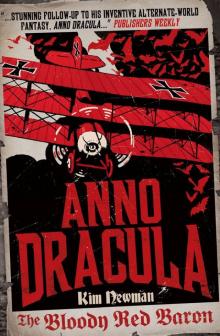 The Bloody Red Baron
The Bloody Red Baron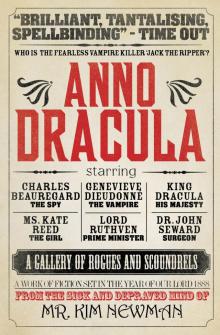 Anno Dracula
Anno Dracula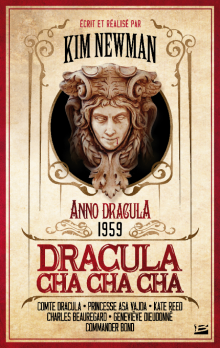 Dracula Cha Cha Cha
Dracula Cha Cha Cha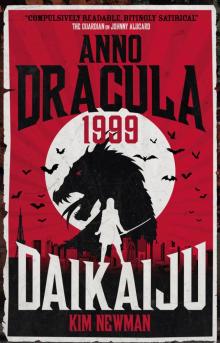 Anno Dracula 1999
Anno Dracula 1999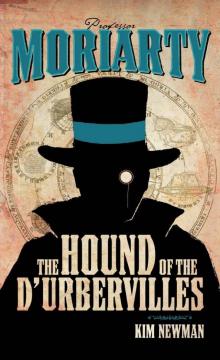 Moriarty: The Hound of the D'Urbervilles
Moriarty: The Hound of the D'Urbervilles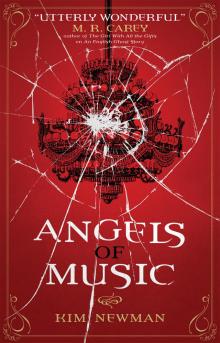 Angels of Music
Angels of Music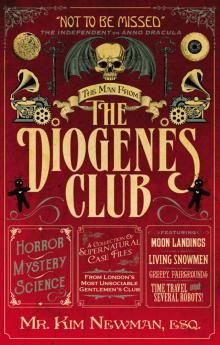 The Man From the Diogenes Club
The Man From the Diogenes Club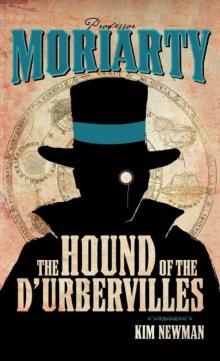 Professor Moriarty: The Hound Of The D’urbervilles
Professor Moriarty: The Hound Of The D’urbervilles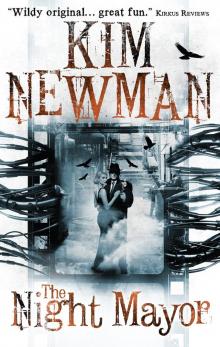 The Night Mayor
The Night Mayor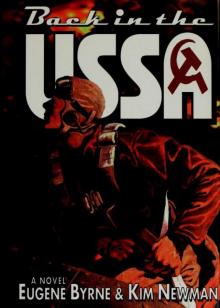 Back in the USSA
Back in the USSA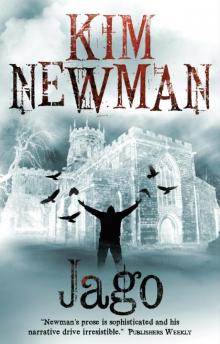 Jago
Jago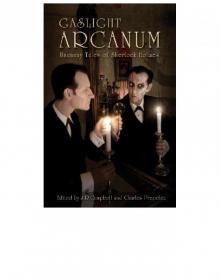 Gaslight Arcanum: Uncanny Tales of Sherlock Holmes
Gaslight Arcanum: Uncanny Tales of Sherlock Holmes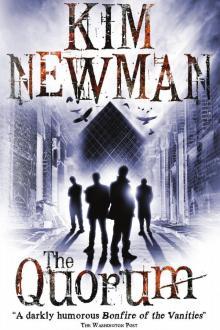 The Quorum
The Quorum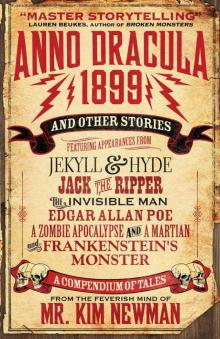 Anno Dracula 1899 and Other Stories
Anno Dracula 1899 and Other Stories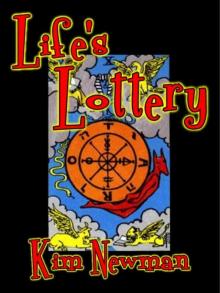 Life's Lottery
Life's Lottery The Secrets of Drearcliff Grange School
The Secrets of Drearcliff Grange School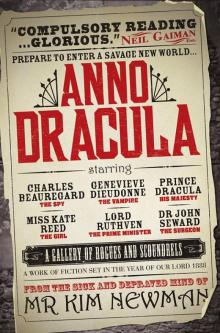 Anno Dracula ad-1
Anno Dracula ad-1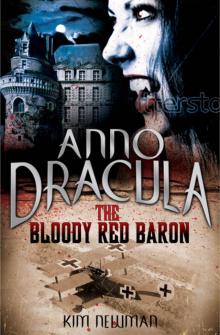 The Bloody Red Baron: 1918 ad-2
The Bloody Red Baron: 1918 ad-2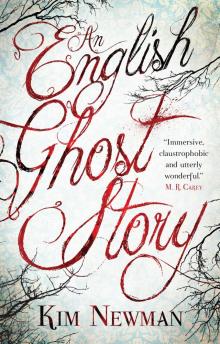 An English Ghost Story
An English Ghost Story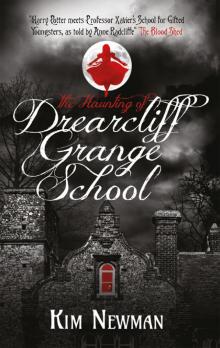 The Haunting of Drearcliff Grange School
The Haunting of Drearcliff Grange School The Other Side of Midnight
The Other Side of Midnight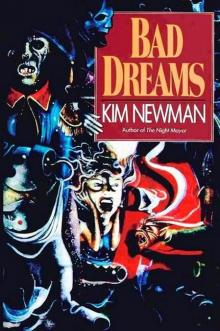 Bad Dreams
Bad Dreams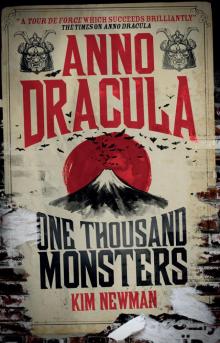 Anno Dracula--One Thousand Monsters
Anno Dracula--One Thousand Monsters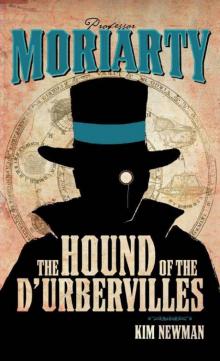 The Hound Of The D’urbervilles
The Hound Of The D’urbervilles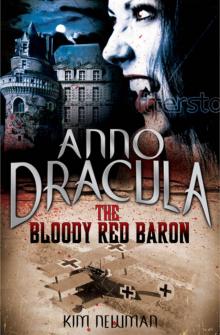 The Bloody Red Baron: Anno Dracula 1918
The Bloody Red Baron: Anno Dracula 1918